
Louis XIII was King of France from 1610 until his death in 1643 and King of Navarre from 1610 to 1620, when the crown of Navarre was merged with the French crown.

Armand Jean du Plessis, 1st Duke of Richelieu, known as Cardinal Richelieu, was a French statesman and prelate of the Catholic Church. He became known as l'Éminence rouge, or "the Red Eminence", a term derived from the title "Eminence" applied to cardinals and from the red robes that they customarily wear.

Jules Cardinal Mazarin, Duke of Mayenne, Rethel and Nevers, born Giulio Raimondo Mazzarino or Mazarini, was an Italian Catholic prelate, diplomat and politician who served as the chief minister to the Kings of France Louis XIII and Louis XIV from 1642 to his death. In 1654, he acquired the title Duke of Mayenne and in 1659 that of 1st Duke of Rethel and Nevers.
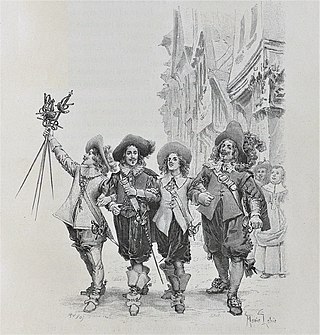
The Three Musketeers is a French historical adventure novel written in 1844 by French author Alexandre Dumas. As with some of his other works, he wrote it in collaboration with ghostwriter Auguste Maquet. It is in the swashbuckler genre, which has heroic, chivalrous swordsmen who fight for justice.
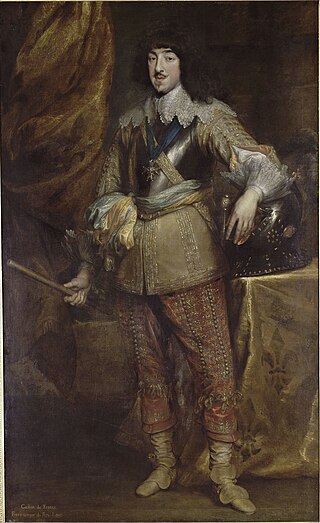
MonsieurGaston, Duke of Orléans, was the third son of King Henry IV of France and his second wife, Marie de' Medici. As a son of the king, he was born a Fils de France. He later acquired the title Duke of Orléans, by which he was generally known during his adulthood. As the eldest surviving brother of King Louis XIII, he was known at court by the traditional honorific Monsieur.
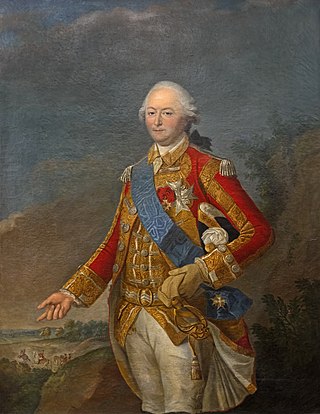
Emmanuel Armand de Vignerot du Plessis, Duke of Aiguillon, was a French soldier and statesman, and a nephew of Armand de Vignerot du Plessis, 3rd Duke of Richelieu. He served as the Secretary of State for Foreign Affairs under King Louis XV.

Marie Anne de Mailly-Nesle, duchesse de Châteauroux was the youngest of the five famous de Nesle sisters, four of whom would become the mistress of King Louis XV of France. She was his mistress from 1742 until 1744.
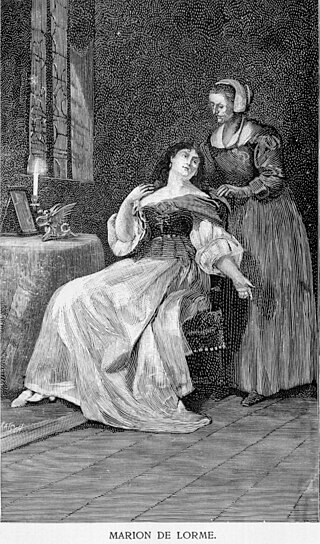
Marion Delorme was a French courtesan known for her relationships with the important men of her time.

The Three Musketeers is a 1993 action-adventure comedy film from Walt Disney Pictures, Caravan Pictures, and The Kerner Entertainment Company, directed by Stephen Herek from a screenplay by David Loughery. It stars Charlie Sheen, Kiefer Sutherland, Chris O'Donnell, Oliver Platt, Tim Curry and Rebecca De Mornay.
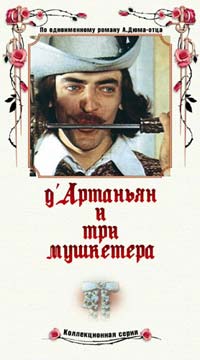
D'Artagnan and Three Musketeers is a three-part swashbuckler musical miniseries produced in the Soviet Union and first aired in 1978. It is based on the 1844 novel The Three Musketeers by Alexandre Dumas, père.

The Four Musketeers (also known as The Four Musketeers (The Revenge of Milady)) is a 1974 British swashbuckler film that serves as a sequel to the 1973 film The Three Musketeers, and covers the second half of Dumas' 1844 novel The Three Musketeers.
More Dissemblers Besides Women is a Jacobean stage play, a tragicomedy written by Thomas Middleton, and first published in 1657.

The Three Musketeers is a 1948 film directed by George Sidney, written by Robert Ardrey, and starring Gene Kelly and Lana Turner. It is a Technicolor adventure film adaptation of the classic 1844 novel The Three Musketeers by Alexandre Dumas.

Cinq-Mars, subtitled Une conjuration sous Louis XIII, is an opera in four acts by Charles Gounod to a libretto by Paul Poirson and Louis Gallet loosely adapted from Alfred de Vigny's historical novel.

The Three Musketeers is a 1986 Australian made-for-television animated adventure film from Burbank Films Australia. It is based on Alexandre Dumas's classic 1844 French novel, The Three Musketeers, and was adapted by Keith Dewhurst. It was produced by Tim Brooke-Hunt and featured original music by Sharon Calcraft.

3 Musketiers is a Dutch musical, also known as 3 Musketiere (German), 3 Musketeers (English) and A 3 Testőr (Hungarian) written by Ferdi Bolland and Rob Bolland. The story is based on Alexandre Dumas, père's 1844 novel The Three Musketeers.

The Three Musketeers is a 1935 film directed by Rowland V. Lee and starring Walter Abel, Heather Angel, Ian Keith, Margot Grahame, and Paul Lukas. It is the first English-language talking picture version of Alexandre Dumas's 1844 novel The Three Musketeers.

The Three Musketeers is a Russian historical adventure film based on the 1844 novel The Three Musketeers by Alexandre Dumas, père. It was produced by The Production Center of Sergei Zhigunov.

Charles de La Vieuville first styled Marquis of La Vieuville but later created 1st Duke of La Vieuville was an important French noble and Superintendent of Finances of France from 1623 to 1624 and once again from 1651 to 1653.
Marion Delorme is a 1918 French silent historical drama film directed by Henry Krauss and starring Pierre Renoir, Nelly Cormon and Jean Worms. It is an adaptation of Victor Hugo's play Marion de Lorme, itself inspired by the life of the courtesan Marion Delorme. Albert Capellani had directed an earlier short film version of the play in 1912.


















